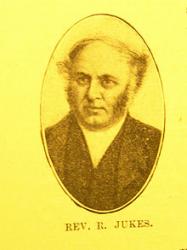
1804 - 1867 Author of "By Faith I View My Savior Dying" in The Cyber Hymnal Rv Richard Jukes United Kingdom 1804-1867. Born at Clungunford, Shropshire, England, his father a stone mason, he was a prankster when young. He followed his father’s trade and became a stone mason for awhile before becoming an itinerant preacher. In 1829 he was part of a team missioning in Wiltshire and Aldbourne. His preaching was sometimes disturbed by efforts to disband the crowd, he even at times had eggs thrown at him. However, a society was formed and a barn was obtained for a place of worship. He was known as “the bard of the poor”. Over time he became a popular Primitive Methodist minister and hymn writer. He married Phoebe Pardoe (1805-1826) in 1825, but she died of typhus after less than a year of marriage. Later, after her death, he married Charlotte Smith (1806-1873), and they had eight children: Mariam, Charlotte, Thomas, Joshua, Amelia, Rowland, Richmond, and Martha. He ministered from 1827 to 1859 at 17 different circuits.. He ministry was widely appreciated. It is noteworthy that several of his appointments were to significant circuits of that time: Tunstall, Staffordshire, Ramsor, and Darlaston in the Black Country, where he spent a large part of his active ministry, retiring there. One trait he had was when writing hymn lyrics, he would try to pair them with popular tunes of the day and sing them in the streets so others would do the same.. and many did. He died at West Bromwich, England.
John Perry
Richard Jukes
